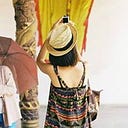I read The Unbearable Lightness of Being when I was 21, in my penultimate year in university. It was recommended to me by a friend who had also read the book in his university days. Over time, after talking to different people in Singapore, some overseas, I realised this was a book that people would read in a particular point of their life, usually in university — a time of budding adulthood where it was customary to start questioning the conventional wisdom of monogamous, long term relationships; exploring the morality of open relationships, infidelity… and their own comfort level with it.
*
When I read the book I immediately identified myself with Sabina, the girl in the bowler hat. I perceived my existence as “light”, refusing to burden myself with unnecessary relationships, jettisoning things and people once the marginal emotional cost exceeded the marginal physical benefit, seeking to free myself from any possibly negative emotions. Personality tests would diagnose it as a “Type 7” archetype, star gazers would attribute it to a fiery Sagittarius disposition. I happily identified myself with these archetypes and played the role passionately.
*
“I had begun life rather late.” I liked this line from a Fitzgerald novel because that was how I perceived my own life, now romanticised because Fitzgerald wrote it. Never distracted by boys as an adolescent because puberty didn’t do anything for me, I started approaching relationships only when I was 20 — in a “rational” manner, whatever rational meant. The first few books that shaped my perception were The Hour Between Dog and Wolf by John Coates and Why We Love? by Helen Fisher. At that impressionable age I decided that man was irrational in relationships when love could actually be explained away as a misbalance of chemicals (I committed the hormones and their functions to my memory: dopamine, oxytocin, serotonin, testosterone). I sought to understand my inevitable attachment towards men with such lenses.
Another perspective-shifting media for me was Gone Girl. The movie made me realise that if two intelligent, reasonable adults couldn’t be happy in a marriage, why should I expect myself to be an exception? I perceived that people heaped too many expectations on a single person, seeking compatibility in multiple fronts: friend, lover, intellectual equal, etc. By listing down these categories I sought to sort people into these them, cognisant that I would never find someone who could fit into all buckets, and if I did try to force someone into all four, unhappiness would befall me.
And that was how I lived my life for 2, maybe more, years. I had my crazy stories. I wrote a memoir. I was light and mostly happy (at least that is how I remember it now).
*
I’m not sure what the turning point was exactly. Maybe the novelty of my lifestyle was starting to wear off. Maybe deep down I hankered for something more romantic, or more eternal. Maybe the right books and philosophy found me at the right time. But as with the previous phase, I can pinpoint the influences that made an impact on me.
The first was an introduction to Nicolas Gomez Davila’s aphorisms. There is a section on Love & Sensuality that made me question my lifestyle. In particular:
“Sexual liberation” allows modern man to pretend to be ignorant of the multiple taboos of another kind that govern him.”
And
“The most recent generations are particularly boring: believing in effect that they invented violence and sex, they copulate doctrinairely and doctrinairely kill.”
I wondered if I had turned the sacred profane.
“To love is to understand the reason God had for creating what we love.”
I also wanted to experience the love that Davila talked about, one which would open more possibilities to my life which I had wilfully shut off, one which would sensitise what I had chosen to desentisise without even experiencing.
On 22 December 2017, on a flight to Cambodia, I spotted this in the Economist’s 1843 magazine:
“In Russia, [so and so] found the spiritual depth he had been craving; ‘If the West explained sex as a result of the interplay of hormones, then here they think it comes from angels.’”
*
So now, I have travelled from a point where I prized rationality over everything else, where I had absolute faith in my capabilities to be rational about people, where I sought to analyse things and people in order to exert control over my emotions, where I loathed vulnerability in myself and others… to a point where the metaphorical is more beautiful than the literal, where perfect rationality is an illusion, where selfless love over self-protection is the aim. From “I’m uncomfortable with saying the L-word” to The Way to Love by Anthony de Mello.
When I recently talked to a girl-friend who bemoaned how ditzy girls are and how she’s reading books on behavioural economics and psychology to be perfectly rational about love, I smile and wonder if she will harbour this attitude forever or will at some point undertake another transformational journey in her life.
Everyone has their own timeline and some things must be felt and learnt over time, not taught.
*
Back to Milan Kundera’s book. I had forgotten about it until I was having lunch with someone who then revealed she had recently finished The Unbearable Lightness of Being. She had just graduated from university. I was pleasantly surprised because she was a native Chinese and I did not imagine Kundera’s scope of appeal over university students until now. I wonder what her journey with love will be.
